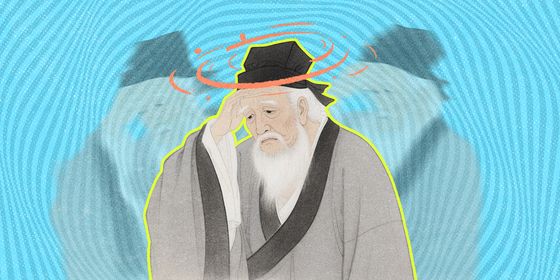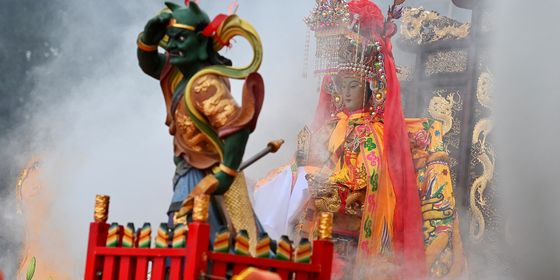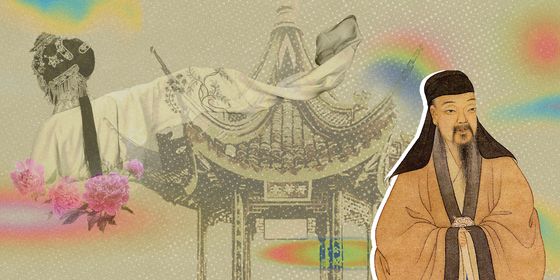A character that is always willing to lend a hand
One morning circa 300 BCE, the sage Mencius lectured his followers, “Those who advocate for justice will enjoy much support, while those who are unjust will have little (得道者多助,失道者寡助).”
Among all the Chinese characters, 助 (zhù, help, support) can always be counted on to lend a helping hand. Its form is self-explanatory: On the right side is the radical 力 (lì), meaning strength, and on the left is 且 (qiě), which was historically a synonym of 祖 (zǔ), meaning family. Together, they suggest members of a family using their combined powers to support one another.
助 also used to have the meaning “to remove,” synonymous with 锄 (chú), as indicated by a passage in the Daoist text Zhuangzi: “Yan Buyi returned and learned from Dong Wu, got rid of his arrogant manner, abandoned degenerate pleasures, bade goodbye to luxury and his noble status. Three years later, all people in the country praised him (颜不疑归,而师董梧,以助其色,去乐辞显,三年而国人称之(Yán Bù yí guī, ér shī dǒng Wú, yǐ zhù qí sè, qù lè cí xiǎn, sānnián ér guórén chēng zhī).” The form of the character has not significantly changed from the Warring States period (475 – 221 BCE) to the present.
In the Eastern Han dynasty (25 – 220), linguist Xu Shen (许慎) wrote in his Analytical Dictionary of Chinese Characters, “助 is the action of assisting (助, 左也).” A passage from Mencius suggests that neighbors should help one another against disaster or enemies: “Those who work in the fields together fight against robbers and bandits together, and care for one another in sickness. That is how the common people become peaceful (出入相友,守望相助,疾病相扶持, 则百姓亲睦 Chūrù xiàng yǒu, shǒuwàng xiāngzhù, jíbìng xiāng fúchí, zé bǎixìng qīn mù).”
This well-known saying is the basis of the idiom 守望相助 (Shǒuwàng xiāng zhù, look forward and help one another), which was widely used during the Covid-19 pandemic: “守望相助,共克时艰 (Shǒuwàng xiāngzhù, gòngkè shíjiān, help each other and prevail over difficulties together),” declared many media slogans at the time.
In ancient times, 助 could be used alone, as in the idioms “助我一臂之力 (Zhù wǒ yībìzhīlì, lend me a helping hand),” and “天助我也 (Tiān zhù wǒ yě, The heavens are helping me),” which describes somebody for whom everything is going right—both sayings are still in use today.
However, 助 can sometimes do more harm than help. Another passage from Mencius relates how a farmer killed his crops by pulling up the seedlings to make them taller: “I am so tired today because I helped seedlings grow tall (今日病矣,予助苗长矣 Jīnrì bìng yǐ, yǔ zhù miáo zhǎng yǐ),” he bragged to others. This fable coined the term 揠苗助长 (Yàmiáo zhùzhǎng, “pulling up seedlings to help growth”), referring to well-meaning assistance that backfires because it doesn’t follow the rules of nature.
When it comes to helping others with evil deeds, the idiom 助纣为虐 ( Zhùzhòu wéinüè , “helping Zhou do evil”) is often used. Zhou, the last king of the Shang dynasty (1600 – 1046 BCE), was a well-known tyrant, and therefore it is not an honor to be named as one of his helpers.
Though 助 can be used as a verb by itself, it is often paired with other characters to refer to specific types of help. 协助 (Xiézhù) is to extend a helping hand to someone, while 求助 (Qiúzhù) is to seek help from others. 资助 (Zīzhù) refers to financial support, and 助 is often paired with 帮 (Bāng), a synonym, to make 帮助 (Bāngzhù), referring to assistance generally.
When a disaster hits, 助 is always coupled with 救 (jiù) to make 救助 (jiùzhù), meaning to offer aid after a disaster such as an earthquake or flood. The government and charitable organizations will provide essential goods and shelter to disaster victims for free, but another form of 助 is not as selfless: 赞助 (zànzhù), referring to third-party sponsorship for an event.
助 is also frequently used in sporting events. The term 助威 (zhùwēi), “to help morale,” indicates cheering on a team. Often, a sports commentator will begin a match by telling the audience, “Let’s cheer for our team (一起呐喊助威 Yīqǐ nàhǎn zhùwēi)!” Athletes may perform a run-up (助跑 zhùpǎo) before a race, or an assist (助攻 zhùgōng) to help their teammates score a point.
It is impossible to get through life without help from others, and some people even have helping others as their job: such as 助教 (zhùjiào, teaching assistants) to help instructors, 助研 (zhù yán, research assistants) to help with experiments, and 助产士 (zhùchǎnshì, midwives) to help mothers deliver babies. Objects also provide assistance, such as a 助听器 (zhùtīngqì, hearing aid) for those who are hard of hearing, or a 助推器 (zhù tuī qì, booster) that helps a rocket launch into space.
Traditionally, it was believed that a good wife contributes to a harmonious household, so they were complimented as 贤内助 (xián nèizhù, virtuous household assistant). Heroes who helped the common people against those who wronged them were also praised. “Wherever I see injustice, I will draw my sword and help out (路见不平,拔刀相助 Lùjiàn bùpíng, bádāoxiāngzhù),” goes the motto of the errant monk Lu Zhishen in The Outlaws of the Marsh.
Today, celebrities are indebted to their fans’ help for their popularity. “老铁们,给我助个力 (Lǎo tiěmen, gěi wǒ zhù gè lì, Friends, have your likes and rewards ready)!” a livestreaming host might implore. Besides literal assistance, 助 can be used as a metaphor, as in the idiom 推波助澜 (tuībō zhùlán, to push the waves and add to the billows), meaning to add fuel to the fire.
When someone is seeking your assistance, it’s best to either 解囊相助 (Jiěnáng xiāngzhù, do your utmost to help), or sincerely declare that you are 爱莫能助 (Àimò néngzhù, willing but unable to help). After all, next time it might be you who needs a helping hand.
On the Character: 助 is a story from our issue, “Rural Rising.” To read the entire issue, become a subscriber and receive the full magazine.













